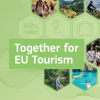The Executive European Innovation Council and SMEs (EISMEA), under the powers delegated by the European Commission, Directorate General for Internal Market, Industry, Entrepreneurship and SMEs (DG GROW), has commissioned a study “Unbalanced tourism growth at destination level – root causes, impacts, existing solutions and good practices.
The study is carried out by Eberswalde University for Sustainable Development and its consortium partner, ÖIR GmbH – the Austrian Institute for Regional Studies, together with Institute of Tourism and Mobility (ITW) at the Lucerne University of Applied Sciences and Arts – Business and will continue until June 2022.
The objective of the study is first, to build solid evidence on the phenomenon of overtourism, in particular by focusing on multiple the root causes and effects of overtourism at the destination level, as well as on gathering concrete best practice solutions (preventive and mitigating actions) that have been successfully applied by tourism destinations in the EU and globally.
It also aims to gather evidence on whether and in what ways the COVID-19 crisis has led to the changes in strategies and actions of the tourism destinations when addressing overtourism phenomenon. This study should bring in new data and fill knowledge gaps, in particular by focusing on the complexity of less addressed causes of overtourism, such as social media, digital platforms and peer-to-peer platforms. Second, the study further proposes a set of overtourism indicators that can serve tourism destinations in establishing their risk analysis frameworks, allowing them to detect the potential risk of overtourism and address the associated challenges in a timely manner.
Finally, to contribute to the dialogue among the EU tourism stakeholders on sustainable tourism, by organising a series of workshops in order to exchange best practice solutions, identify common problems, assess and validate the proposed indicators. Five workshops are therefore organised in locations representing one of the five types of destinations examined within the framework of this study, namely urban, rural, mountain, island and coastal destinations. The concluding sixth workshop will be organised in Brussels.
The purpose of this group is to continue the stakeholder dialogue on sustainable tourism, overtourism, its impacts and best-pratice solutions.

